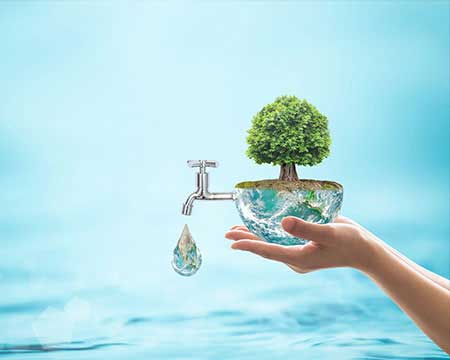
WATER COOPERATION FOR A RESILIENT PLANET

Water security plays a key role in both the social as well as economic development of a country. India along with its South Asian neighbours has sizeable water resources; but faces huge challenge as the distribution of water varies widely by season and region. Per capita water availability in India has decreased by almost 70% since 1950, due to increasing pressure from population growth, economic development, industrialisation, urbanisation and inefficiency in water use. Furthermore, climate change has aggravated the stress on available water resources.
Such an increasing stress is leading to water crisis situation and has the potential for conflict in South Asia, while affecting the overall economic growth of the region through its cascading impacts on different sectors. The United Nation’s Sustainable Development Goals recognize water as the key element of sustainable development by setting a dedicated global goal for water. Goal 6 of SDGs on water further sets a target to “expand international cooperation and capacity-building support to developing countries in water- and sanitation-related activities and programmes, including water harvesting, desalination, water efficiency, wastewater treatment, recycling and reuse technologies”, by 2030.
International Water Cooperation
Twelve major river systems drain the Indian subcontinent along with a number of smaller rivers and streams forming a total catchment area of approximately 252.8 Mha. Despite the existence of many bilateral treaties, friction over water resources in South Asia persists. India is particularly involved in international water frictions by virtue of its location and the fact that it shares borders with all other countries in the region. Trans-boundary water disputes are especially critical in South Asia as the countries are heavily populated and their economy is mainly agrarian in nature. As a result local demand for water is very high, and lack of technical competence, financial resources as well as political determination, makes it easier to demand for more water than to manage available water efficiently.
Disputes over water will further intensify as the impacts of climate change become more pronounced. In such a scenario, it is important to foster the spirit of sharing, while developing efficient water management systems as well. This will ensure water security while reducing the stress on economic development of the region.
Interstate Water Cooperation
State governments in India dominate the allocation of river waters. However, as the rivers cross state boundaries, disputes are inevitable. Numerous inter-state river-water disputes have erupted since independence. The Inter-State Water Disputes Act of 1956 provisions for the establishment of tribunals to adjudicate where direct negotiations have failed between the states. However, arbitration is not binding and states have sometimes refused to accept the decisions of tribunals. Regional interests dominate the concerns of states and even the court decisions and interventions by central government have usually been unsuccessful.
Hence, constructing efficient and equitable mechanism for allocating river flows and negotiating inter-state water disputes is necessary to ensure national water security. An unambiguous and transparent framework with well-defined water rights, and institutions to facilitate and implement cooperative agreements are required to promote water cooperation.
Inter-sectoral Water Cooperation
Various sectors like Agriculture, Mining, Industry and Construction compete for water with domestic sector. Agriculture consumes the largest amount of water in comparison to other sectors. With increase in population and consequential increase in food demand, agricultural activity will increase in future, imposing further stress on water resources. Simultaneously, economic development will lead to increase in water demand from other sectors, also.
Moreover, water is needed throughout the energy supply chain, sometimes as a direct input as in the case of hydropower or geothermal energy, as a coolant in thermal power plants or more often for the extraction and processing of energy fuels.
Hence, inter-sectoral water cooperation is necessary to harmonize the demand for water from different sectors, without adversely affecting the growth prospects of individual sectors. This will have additive benefits through synchronizing the interdependence of water and energy on each other.
The plenary session on ‘Water Cooperation for a Resilient Planet’ aims to explore some key issues pertaining to water allocation and conflicts through deliberations from distinguished panellists and guests:
Key questions
- How can water conflict be transformed into opportunities for water cooperation? What are some good examples of this transition? Can these models be followed, or is each situation unique?
- What should be the sharing model between the upstream and downstream states? What are the impacts at the regional level due to projects planned for water or energy security? Is there a win-win solution to water allocation and sharing arrangements?
- What should be the governance model and allocation strategies to resolve inter-sectoral competition for water? Is there a role for other mechanisms such as demand management and supply-augmentation? Must all these solutions be multi-lateral, or can states act to implement some of these initiatives in a unilateral manner?